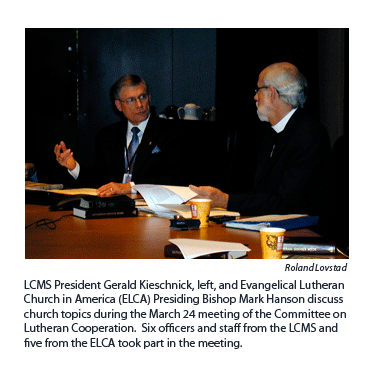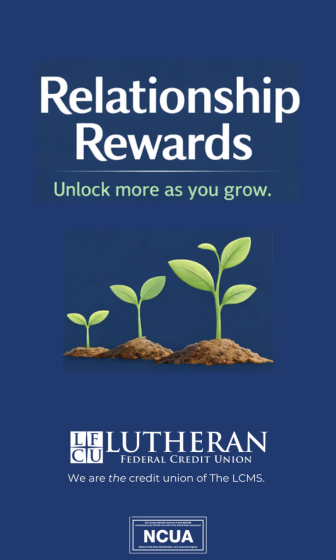ST. LOUIS — Leaders of the two largest U.S. Lutheran church bodies met March 24 in St. Louis for the 32nd regular meeting of the Committee on Lutheran Cooperatio n.
n.
During the half-day meeting, representatives from The Lutheran Church–Missouri Synod and the Evangelical Lutheran Church in America (ELCA) reported on recent developments in each of their respective church bodies. Topics included a report on the recommendation of the Missouri Synod’s Blue Ribbon Task Force on Synod Structure and Governance, plans for participation in the Lutheran Malaria Initiative (a collaborative effort of both church bodies with Lutheran World Relief), and a review by the ELCA representatives of the proposals by the Task Force for ELCA Studies on Sexuality.
Much of the discussion at the meeting focused on the two documents produced by the ELCA task force: a proposed social statement titled “Human Sexuality: Gift and Trust” and the “Report and Recommendation on Ministry Policies.” Leading the discussion were Dr. Rebecca Larson, executive director of the ELCA unit on Church in Society, and Dr. David Tiede, professor at the ELCA’s Augsburg College in Minneapolis and a member of the task force, who participated by telephone. The documents will go before the ELCA’s Church Council on March 27-30 and then to the 2009 ELCA Churchwide Assembly on Aug. 17-30.
Released in mid-February, the ELCA’s proposed social statement was accompanied by the “Report and Recommendation on Ministry Policies.” The report recommended a process, which, if all four steps were adopted, would allow flexibility for people in “publicly accountable, lifelong, monogamous, same-gender relationships” to be approved for the professional rosters of the ELCA.
While much attention has focused on the task force’s discussion of same-sex relationships, Larson expressed hope that people will give attention to the rest of the document. She said that the task force had worked with the concept of “bound conscience,” which includes recognition of the “bound conscience” of others. “While the task force did not reach full agreement,” stated Larson, “it did affirm that different understandings can be included in our life together as a church.”
Larson said, “We are not in agreement on how and whether to honor these relationships within the community of the church, but we are absolutely united in our understanding of our common baptism and commitment to be faithful in the ministry and mission to which the church is called.”
Noting that the ELCA relationship to the LCMS is highly valued, Larson added, “We need your accompaniment and I hope you will be able to trust with us that the Holy Spirit will be present at the assembly so that whatever decisions we take will be to the glory of God.”
In the discussion on the issue of “bound conscience,” Dr. Joel Lehenbauer, executive director of the LCMS Commission on Theology and Church Relations, questioned whether the ELCA report had addressed the full complexity of this issue. “The ‘bound conscience’ of a Christian,” stated Lehenbauer, “often includes being constrained by Christ’s love to help a fellow Christian see how his or her conscience may be wrongly bound.”
Larson noted that the full richness of the concept in the Lutheran tradition could not be fully discussed in the statement.
LCMS President Dr. Gerald Kieschnick had earlier issued comments on the ELCA report, noting that the LCMS has repeatedly affirmed the biblical truth and historical understanding of the Church which condemns homosexual behavior as “intrinsically sinful and therefore contrary to the will of the Creator and constitutes sin against the commandments of God.”
The Missouri Synod representatives expressed the desire of the LCMS, given its position on the sinfulness of homosexual behavior, to be of assistance to the ELCA as it debates and considers the recommendations of the task force.
“We in the LCMS want to be helpful to you at this time, with integrity to our own church’s position on this matter, but also with our prayers and with our love and concern,” said Dr. Samuel Nafzger, LCMS director of church relations, assistant to the president.
Later in the meeting, Rev. Jon Braunersreuther, senior assistant to President Kieschnick, reported on the process of sharing restructure proposals from the LCMS Blue Ribbon Task Force on Structure and Governance for comments and input from LCMS district conventions this year. The task force is shaping the proposals and will bring them to the 2010 LCMS convention. Braunersreuther said the motivating factors in restructure were to support congregations in their mission and ministry, as well as effecting better stewardship of church resources.
The participants also shared developing plans for the Lutheran Malaria Initiative, which is being undertaken with Lutheran World Relief, Baltimore, to educate about the impact of malaria and collaborate in efforts to contain the disease.
In addition to Kieschnick, Lehenbauer, and Nafzger, LCMS participants in the meeting were Dr. William Diekelman, LCMS first vice president; Dr. Raymond Hartwig, LCMS secretary; and Dr. Ronald Schultz, chief administrative officer of the LCMS Board of Directors. Representing the ELCA were Presiding Bishop Mark Hanson, Carlos Peña, vice president; and Dr. Donald McCoid, executive for Ecumenical and Inter-Church Relations, along with Larson and Tiede.
Posted April 1, 2009




